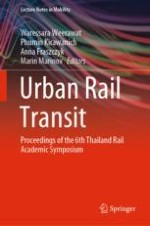2021 | OriginalPaper | Chapter
An Optimal Multi-objective Train Speed Profile for Mass Transit Systems Using a Genetic Algorithm-Based Technique
Authors : Chaiyut Sumpavakup, Phumin Kirawanich
Published in: Urban Rail Transit
Publisher: Springer Singapore
Activate our intelligent search to find suitable subject content or patents.
Select sections of text to find matching patents with Artificial Intelligence. powered by
Select sections of text to find additional relevant content using AI-assisted search. powered by
